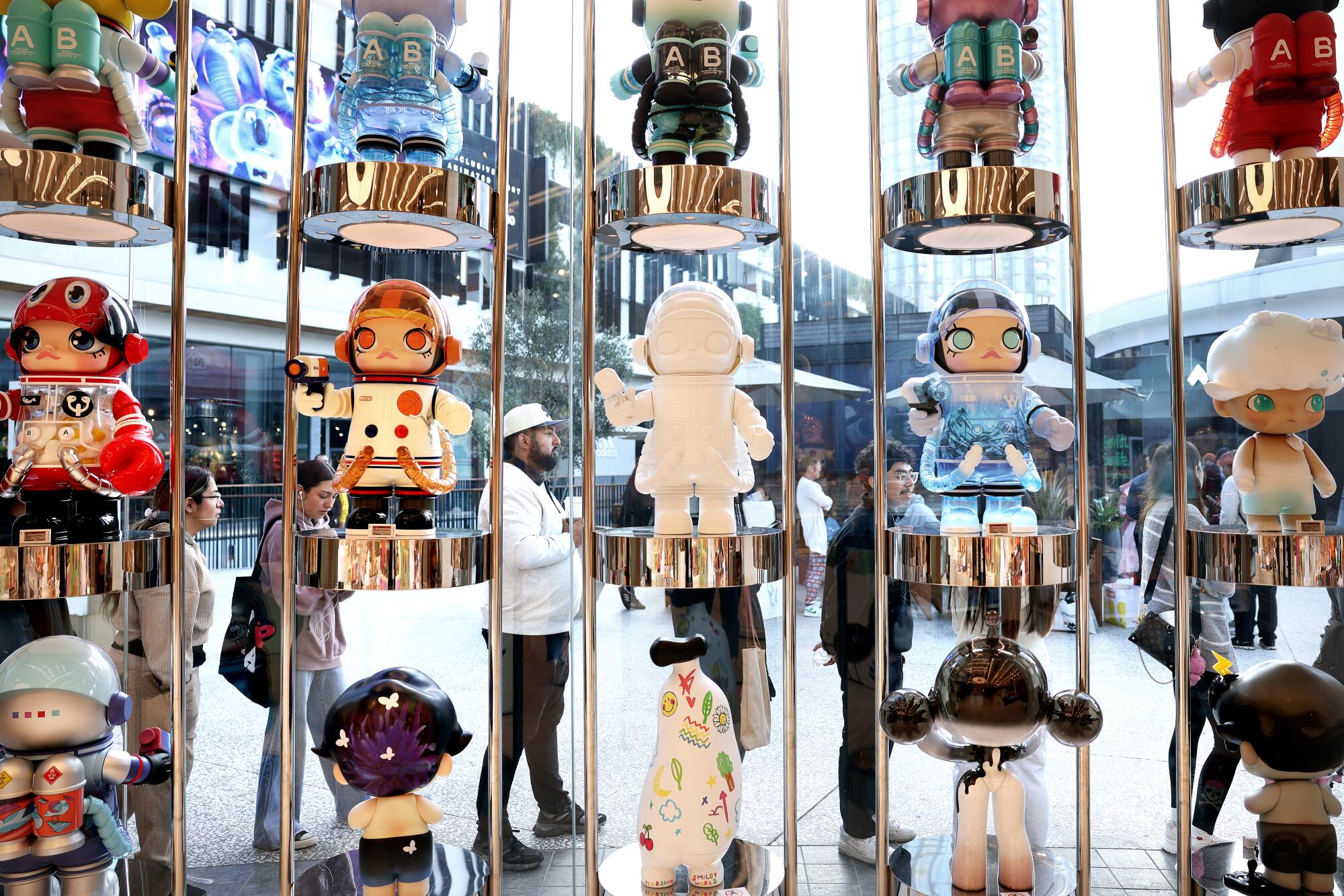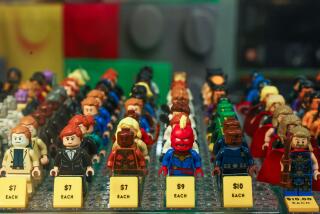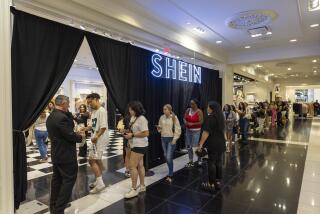
- Share via
- A global frenzy has erupted for Labubu, a furry elf character made by Chinese toy company Pop Mart.
- Since April, every new release and restock of plush Labubu dolls has sold out, usually within minutes. Grown men and women have fought over her. Counterfeits and resellers have flooded the market.
- Labubu’s massive success has been great timing for Beijing-based Pop Mart, a huge brand in Asia that began opening stores in the U.S. last year. Worldwide, it has more than 500 retail shops and 2,500 toy vending machines in 30 countries.
Every few Fridays, in the middle of the night, a line forms outside the Pop Mart store at Westfield Century City.
It’s the same scene over at Glendale Galleria. And at South Coast Plaza. Victoria Gardens in Rancho Cucamonga, too.
They come by the hundreds, all vying for the latest Labubu, a furry toy character with rabbit-like ears and a nightmarish grin stretched wide over a row of serrated teeth. Labubu, her legion of fans will tell you, is female, the size of a cat and a tad mischievous. She belongs to a Nordic tribe of elves known as the Monsters. She is very soft. They insist her boyfriend is a look-alike figure named Zimomo, but Pop Mart denies the relationship.
A global buying frenzy for all things Labubu erupted in April when Lisa, a member of the popular K-pop girl group Blackpink, posted a video on Instagram of her hugging a large Labubu plush doll. The 27-year-old megastar, who isn’t a brand spokesperson, further fueled the mania by accessorizing her luxury handbags with small Labubu pendants.
Since then, every new release and restock of the plush dolls has sold out within minutes in stores and within seconds online. Grown men and women — Labubu’s core customers are adults, not kids — have fought over her and police recently had to manage an unruly crowd at a Singapore toy show where Labubus were being sold. Last month, a family allegedly broke into a claw machine filled with boxes of Labubus and stole three of them. Fakes and resellers have flooded the market.
It’s a sudden and astonishing ascent for an ugly-cute character that debuted nearly a decade ago, and fortuitous timing for Pop Mart as it makes a major push into the U.S.
Founded in 2010, the Chinese toy maker has seen enormous success overseas for its artist-designed collectibles, growing to around 500 retail shops and 2,500 toy vending machines in 30 countries. The company’s stock price has more than tripled this year, giving Pop Mart a market cap of $12.1 billion. It opened its first permanent U.S. store in September 2023 and has quickly expanded to 16 locations around the country, seven of them in California.

Opened in February, the Century City Pop Mart is a maximalist shrine of whimsical characters such as Skull Panda and Dimoo and their many, many related products: vinyl plush dolls in all sizes, action figures, keychains, stationery, purses and tote bags, cups, hair clips, smartphone and earphone cases, lamps and night lights.
These days Labubu is the must-have character, with her merch universe ranging from an $8.99 fridge magnet to a “Mega 1000%” — a giant 31-inch plastic figurine that sells for $959.90.
Blind boxes are in high demand: The packages are sealed and contain a random product from a collection, injecting an element of surprise and tempting customers to buy boxes over and over until they get the exact figure they want. Similar to packs of baseball trading cards, a few lucky boxes contain rare “secret” figurines that are not part of the regular series.
“It’s a high and it’s excitement,” said Jon Shapiro, 48, who arrived at 2:30 a.m. to be first in line at a recent Pop Mart release in Century City. “You start buying sets and you’re like, ‘OK, well I need the whole collection.’ It’s like you have a mission.”
Shapiro, who owns a home inspection company, visited Pop Mart for the first time in January during a trip to Paris and “just got addicted.”
“It would blow your mind,” he said of the number of Pop Mart collectibles he has since acquired, which span “almost every collection” and fill his living room in downtown L.A. from floor to ceiling. “I would say I’ve probably spent minimum $10,000.”
“I’m not a collector of anything else,” he said. “But for some reason, Pop Mart got me.”
On that Friday morning in late October, more than 100 superfans had gathered outside the Pop Mart store before 9 a.m., having learned about the product drop from the brand’s social media posts.
Up for grabs: 29 large Zimomo dolls, 30 six-box blind sets of Labubu pendants and 40 Labubu purses.
1

2

1. Labubu vinyl plush pendants on display. 2. The Century City Pop Mart store had only 40 Labubu purses for sale during an October launch. They sold out in less than an hour.
A squabble had broken out a few hours earlier over line position, store manager Henry Nguyen said, and mall security stepped in to restore order. “There was an escalation,” he said. “It was chaotic.”
Just a few days before, an Australian TikTok user posted a video from a different Pop Mart that showed hordes of shoppers waiting for the store to open, some sleeping on the ground outside the shopping center’s sliding doors overnight.
“Everyone started screaming, shoving and rushing in, and people even got crushed at the sides of the doors,” Lawrence Yu said in the video, which has been viewed 1.2 million times. “There was a group of poor Asian aunties that had all got pushed to the floor. They grazed their knees and they also snapped a few nails, too.”
I’m not a collector of anything else. But for some reason, Pop Mart got me.
— Jon Shapiro, 48, a Pop Mart superfan
The phenomenon has forced staff at each Pop Mart store to devise their own crowd control plans on the fly. To get the line in Century City moving, Nguyen decided to open an hour early, reminding customers that they were limited to one Zimomo doll ($289.99) or one complete Labubu blind set ($131.94).
Once they made it through the doors, elated shoppers grabbed blind boxes and vigorously shook them to try to discern what was inside. A mother and daughter from Inglewood filmed an unboxing video for TikTok as soon as they finished paying. The store has several Instagram group chats filled with hundreds of customers, and those on the scene posted real-time updates to let others know how many items were left.
It was all over in about an hour, with people toward the back of the line dispersing once it became clear they wouldn’t make the cutoff. Some grumbled about resellers, who sell their Labubu hauls at exorbitant markups, being among those who had swarmed the release.

Shopping online is just as disheartening, they lamented, because of bots programmed to hoover up products the instant they’re available. The night before, the Zimomo plush sold out in less than a minute on Pop Mart’s website and TikTok Shop.
“We’re not trying to manufacture” scarcity, said Emily Brough, head of licensing for Pop Mart North America, which is headquartered in Glendale.
“It’s not like we’re just sending 12 to the store so that there’s this craze and nobody gets what they want,” she said. “We want people to get what they want, and we do try to stock up for the demand.”
Brough attributed the limited quantities to the Beijing-based company’s supply chain timeline — Pop Mart places its orders months in advance, sometimes before a particular toy has taken off. The company said it is working on strategies to make things more fair and to better manage the masses at its U.S. stores on product launch days.
Mattel, Lego and other toy companies are targeting a growing number of adults who are buying toys for themselves.
Pop Mart reported record revenue of $638.5 million for the first half of 2024, a 62% increase over the same period a year earlier. Sales in its burgeoning North America segment totaled $24.9 million; more than three-fourths of its revenue comes from Southeast Asia and East Asia.
Plush toys, a hot category in the toy industry, did monster numbers: Pop Mart said revenue skyrocketed nearly 1,000% in the first half of the year, to $62.5 million. The company declined to discuss Labubu-specific sales figures or to comment on whether it was ramping up production.
Creating a viral hit is the dream for toy makers, and there is no “exact formula,” Brough said. “This is the first time that we’ve seen anything like this in North America.”
Pop Mart has benefited from some right-place-right-time luck: Its Labubu pendants double as bag charms, which have been a huge trend in the fashion world. “Kidults” — adults who are big consumers of products traditionally made for children — have been on the rise. And the organic social media love from Lisa and other celebrities was also invaluable.
1

2

1. An employee rings up a Labubu purse for a customer. 2. The most coveted item during a recent Pop Mart launch was a large Zimomo doll for $289.99.
But more than anything, Pop Mart has mastered the hype playbook.
Collectors say they became hooked by the psychological thrill of the blind-box chase and the satisfaction of completing a set; the steady release of special collaborations and seasonal collections (a recent Halloween-themed Labubu had the elf wearing a pumpkin outfit); and the feeling of desperation that comes with wanting something in short supply.
There are also surprise, midday product drops in stores and online. That unpredictability has led people to compulsively check the stores’ Instagram Stories for news of spontaneous restocks.
Whenever one is posted, customers within quick driving or running distance descend upon the store, as they did last Thursday afternoon after the Century City Pop Mart used red siren emojis to announce it had 83 Labubus for sale: “Hot restock announcement… sales start right now.” A shopper who rushed over said everything was gone in less than 20 minutes.
They’re very limited, so that’s why you want it. You kind of crave it.
— Justine Cristobal, 34, a Labubu collector from Pico Rivera
The challenge will be to keep it going.
“The biggest problem with the industry is these things are really popular when they’re popular, and then they’re just not relevant anymore,” said Jaime Katz, an equity analyst at Morningstar. “You have to change the storyline, you have to evolve what you’re selling, you have to think about what would get consumers to make that next purchase.”
Pop Mart began as a general merchandise retailer selling third-party toys and other products. Over time, it pivoted to making designer toys, working closely with independent artists via licensing deals. The toys, which are mainly manufactured in China, found a broad audience among Gen Z.

Hong Kong-born artist Kasing Lung is the creator of Labubu and the other Monsters creatures, which first appeared in 2015 in a series of picture books; Pop Mart began selling Labubu merchandise four years later.
Lung told The Times that he incorporated elements of his own personality into Labubu’s narrative, such as her “naughtiness,” which he believed made the character more compelling.
He realized the impish elf had become a runaway success when “one day my parents asked me for a Labubu doll,” he said. “That was the specific moment for me.”
Now, obsessed fans are showcasing them in acrylic display cases in their homes, clipping them onto their backpacks and purses, and customizing them with fake eyelashes, tiny clothes and braces.
Justine Cristobal and her partner, Marivene Del Rosario, began buying Labubu in September. In two months, they’ve spent $2,500 on 28 small plushes and three large ones, driving to Pop Marts all over Southern California twice a week and meeting other collectors in coffee shops and at their homes to swap figurines.
“Sometimes we go to different Pop Marts just to check out what they have in the same day,” said 34-year-old Cristobal, a nurse from Pico Rivera.
But the secret chestnut-cocoa Labubu — there’s only one in every 72 boxes — has eluded them.
“It’s a reason for us to buy more and then we’ll just trade the ones that we already have,” she said. “They’re very limited, so that’s why you want it. You kind of crave it.”
More to Read
Inside the business of entertainment
The Wide Shot brings you news, analysis and insights on everything from streaming wars to production — and what it all means for the future.
You may occasionally receive promotional content from the Los Angeles Times.













